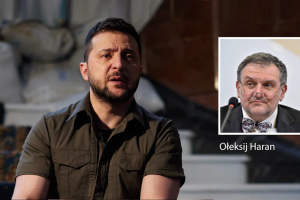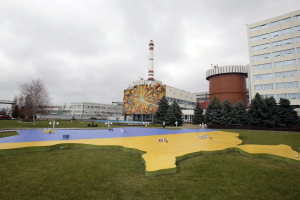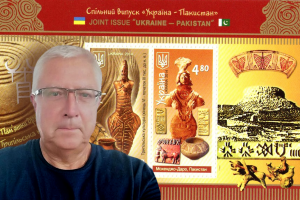
Dmytro Babachanakh, associate analyst
The country’s oligarchs seek to bypass official foreign policy channels
In the absence of a regional framework following the dissolution of the Soviet Union, Russia sought to influence Ukraine covertly by working directly with Ukrainian oligarchs. One consequence of this hybrid control was the ever-shifting foreign policy of Ukraine prior to 2014 – oftentimes, the actions of oligarchs on the international arena went against the decision-making of Kyiv’s official structures.
Control over Ukraine’s lucrative infrastructure pertaining to the transit and extraction of natural gas has been a focal point of Russia’s efforts. For the oligarchs, it was a way to make huge profit. For Russia, Ukraine’s industrial gas complex served as a powerful leverage when negotiating with Europe and the near abroad, which depended on Russian supplies that go through Ukraine’s pipeline network.
Since 2014, Ukraine sought to decrease its dependence on Russia, an effort that was impossible without strengthening Naftogaz, Ukraine’s biggest state-owned energy company. The U.S. emerged as Ukraine’s primary security partner and, among other priorities towards Ukraine, supported the company’s reform.
The governments of Ukraine and the United States had different reasons for fighting post-Soviet oligarchs, which often meant reducing their control over the state’s institutions. For Ukraine as democratic project, it was an all-encompassing issue, and the U.S. was dissatisfied with the abuses of the West’s financial systems by Russian oligarchs as well as Russia’s growing aggression – so their interests converged.
At the same time, dubious economic interests were key to creating informal channels of communications between Ukrainian and American elites, a relationship that evolved to become institutional and legitimate over time.
Ironically, the foundation for the informal US-Ukraine relations was laid by Viktor Yanukovych, a politician who is denounced for his pro-Russian overtures, and his circle of oligarchic supporters. An important member of the ex-president’s entourage, Ukraine’s oligarch Firtash dug up Yanukovych’s connections and attempted to use them to take back control over the gas infrastructure only to fail miserably.
Oligarch diplomacy
Oligarchic diplomacy in the post-Soviet space originated in Russia – it effectively pursued foreign policy via unofficial means after it integrated oligarchs into the political landscape.
In a revealing account of Russia, Mikhail Zygar attributes the phrase “Ukraine does not do politics; it does business” to Medvedchuk, Putin’s best friend in Ukraine.
After a relatively pro-Western Yushchenko was elected President of Ukraine, Medvedchuk set up a business club for oligarchs to manage Ukraine. He sought to transfer decision-making from the President to the business elites, who were largely pro-Russian as Ukraine’s economy was oriented towards Russia.
Post-Soviet oligarchs have repeatedly hired Republican operatives to further influence in Ukraine or the U.S., among other countries. In fact, this phenomenon boasts names such as Akhmetov, Firtash, Pinchuk, and former presidents of Ukraine Yanukovych and Poroshenko.
Lobbyism is a legal activity in the U.S., and oligarchic groups employ Republican connections, among others, to further interests in mining, oil, gas, and other industries. It is not surprising that many of these industries were on the top of the list for Republican lobbyists during the 2016 election cycle.
Ukrainian oligarch Dmytro Firtash knows all about it. A true veteran of oligarch diplomacy, Firtash distinguished himself both in Ukraine and the United States. In the U.S., he faces bribery charges, but his influence abroad is less far-reaching than his activities in Ukraine.
A trusted partner of the famed post-Soviet bandit Mogilevych, Firtash controlled Ukraine’s gas imports from Turkmenistan and Russia between 2002 and 2009. To do so, he created an elaborate scheme that took care of both domestic and foreign partnerships. His companies Eural TransGas and RosUkrEnergo served as intermediaries between Russia’s Gazprom and Ukraine’s Naftogaz - a move that delivered sizable profit on the difference between the price of gas coming out of Russia into Ukraine.
The knowledge about the dealings of the company came with hindsight. At the time, RosUkrEnergo was known as an Austrian company, its owners undisclosed. A decision to base the company outside of the post-Soviet space gave it legitimacy in the West and made investigating the company more difficult. In fact, it was only when the FBI began investigating Mogilevych in 2008 that Firtash came to be known as the owner of the company. Its reach went beyond Ukraine - it delivered gas to Hungary, Poland, and Romania.
Firtash’s control over Ukraine’s gas imports was over in 2009, when Ukraine’s court ruled in favor of the direct engagement between Naftogaz and Gazprom, but oligarch diplomacy continued to bloom.
Firtash used the money coming from illicit gas contracts to sponsor the candidacy of Victor Yanukovych for presidency and got close to Paul Manafort, a Republican operative, in the process. In fact, the two repeatedly planned to renovate the famous Drake Hotel in New York City - a plan that never materialized due to the legal problems both men faced.
What is significant about Firtash’s conduct is his ability to establish legal connections with partners in Western countries, one of the many ways Russia weaponized its foreign policy.
Yanukovych, elected Ukraine’s President in 2010, updated the practice when he combined his status as an oligarch and Ukraine’s President. Although the man mainly sought self-enrichment, Yanukovych managed to attract significant investment from the West, a source of struggle for Ukraine’s presidents ever since Ukraine became independent in 1991.
The deal matured during Yanukovych’s time in office, when Paul Manafort helped Yanukovych to forge connections with industry leaders and Western politicians - between 2010 and 2013, Ukraine’s leader signed agreements with Chevron, Shell, and Exxon to explore and extract gas.
The so-called fracking revolution was taking place, and American businesses, often leaning towards Republicans, were counting their money. For Ukraine, this meant that gas reserves that were previously inaccessible became available for extraction as new technology arrived.
Pre-2014 projects were eventually terminated after Russia engaged in open military aggression against Ukraine in the regions neighboring the promising gas fields.
Firtash attacks and fails
As the country sought to become more independent from Russia, the influence and wealth of oligarchs diminished. Trade with Russia plummeted after 2014 when Poroshenko assumed the presidential office and navigated the interests of the relatively pro-Ukrainian oligarchs, including his own, all while mostly prioritizing the country’s interest.
Giants like Kolomoyskyi and Firtash, those on the more pro-Russian side of the oligarch specter, continued to lose weight. Both were prosecuted by the United States – Firtash was even ordered to be extradited to the U.S. from Vienna in 2014. Rinat Akhmetov, who lost profit due to the war in the East of Ukraine and opposed Russia’s plan to establish the bogus DPR and LPR, became relatively stronger.
However, pro-Russian economic interests did not fade away entirely. Neither did their Republican business partners. In 2019, Firtash joined efforts with Giuliani, a connection he made via Paul Manafort, to challenge Naftogaz, a company that undermined Firtash’s control of the gas imports in Ukraine.
The alliance was neither unexpected nor carefully planned. Giuliani, who has personal business connections in Ukraine as well as the benefit of exploring those of Trump’s associate Paul Manafort, recruited Fruman and Parnas, members of the Ukrainian diaspora in the U.S. to replace the leadership of Naftogaz. The two approached Favorov, a high-ranking Naftogaz official with overblown credentials and tried to persuade Favorov to head Naftogaz. Fruman and Parnas also offered Naftogaz to exclusive rights to build and control a gas connector with Poland for twenty years and transfer the ownership of the connector to third parties. They were also paid $1 million by Firtash during this period.
Favorov refused, and Naftogaz officials thought the deal was empty. At the time, the company was struggling to find the liquid funds necessary to accumulate gas supplies to have the upper hand in the negotiations concerning gas transit with Gazprom - the previous agreement was set to expire by the end of 2019.
At the time, the Cabinet of Ministers, headed by Groysman, blocked the company’s access to liquid assets, including eurobonds. Groysman has been repeatedly accused of corruption by top-level Ukrainian politicians, and the information that members of his team were paid off by Firtash coming from Naftogaz is no big surprise. Eventually, President Poroshenko applied pressure, and Ukraine was able to free up the resources necessary to purchase the surplus gas.
Notably, it was at this time that Ukraine held the presidential election – Russia is known to time its operations during periods of transition.
By the end of the year, the country approached the negotiations with Russia with the highest amount of reserves it has had in years as it was able to purchase from private contractors.
It should not come as a surprise that Naftogaz was at the center of Western influence after 2014. IMF, an organization representing the institutional foreign policy efforts of the U.S., repeatedly demanded Ukraine to pass amendments to legislation that would allow Naftogaz to become a market-oriented institution and threatened to withhold critical funding for Ukraine.
Although Poroshenko and Zelenskyi have been criticized for failing to support reforms in critical areas, such as health care and the judiciary branch, both Presidents have contributed to the reform on Naftogaz, Ukraine’s state-owned oil and gas company. What was an unprofitable, shady, and inefficient company under Yanukovych has transformed into the highest tax contributor in Ukraine delivering 14% of the country’s taxes between January and November of 2019.
Ukraine’s increasing role in Europe’s energy sector goes together with the interests of Western partners. The U.S. energy strategy has been to promote plentiful supply of energy resources - whether oil or gas is concerned - in contrast to Russia, which benefits from high oil prices when supply is limited. Europe emphasizes diversification of resources and expansion of energy supply in Eastern and Central Europe.
The EU has long recognized that Russia is an energy security threat. Disruptions of gas passage through Ukraine by Russia via Firtash in 2006 and 2009, most likely part of Russia’s so-called “energy superpower” strategy, showed that Europe needed to adapt to the challenges posed by the Kremlin. Russia’s annexation of Crimea and escalation of war in the East of Ukraine added to the sense of urgency.
Rather than negotiating with Russia directly and forcing it to change its policy, the West wisely decided to invest in Ukraine to counter Kremlin's aggression. Reforming Naftogaz and encouraging gas extraction is part of the solution that will allow Ukraine to become an energy exporter by 2030, according to a report from Ukrainian Institute for the Future.
European countries have been working to create a strong infrastructure that would allow plentiful supply for allied countries in Eastern and Central Europe. According to the 2018 BP Statistical Review of World Energy report, Ukraine and Poland emerge as the chief potential suppliers. To supply energy sources across Central and Eastern Europe, the EU plans to construct pipelines that connect LNG terminals in the Mediterranean and Poland. Baltic Pipeline is meant to extend that infrastructure.
Ukraine will remain an integral part of this new energy arrangement. As a gas transporter, Ukraine will keep transiting Russia’s gas in the short term and build a robust reverse capability with Poland that has access to the U.S. LNG in the long term. Further, Ukraine’s new role as a gas exporter, will allow it to transit its very own gas through the Ukrainian pipelines, which require constant use to remain functional.
Looking forward
Informal connections Ukraine’s elites make with the West are a double-edged sword. On one hand, they can bring investment into the country. On the other hand, they can be abused by pro-Russian actors since Ukraine’s business elites have traditionally leaned towards Russia.
The gas sector in Ukraine remains a lucrative piece, and the reform of Naftogaz has proved that institutional efforts can attract significant investment from abroad – an alternative to shady investment deals concluded by Yanukovich’s administration.
When it comes to the extraction and transportation of natural gas, integrating with European markets is a clear solution. Poroshenko, Akhmetov, and Kolomoyskyi are the three remaining Ukrainian oligarchs that can influence state institutions. Finding creative ways to limit their influence and reorient economic flows away from Russia and towards the West remains a priority.








